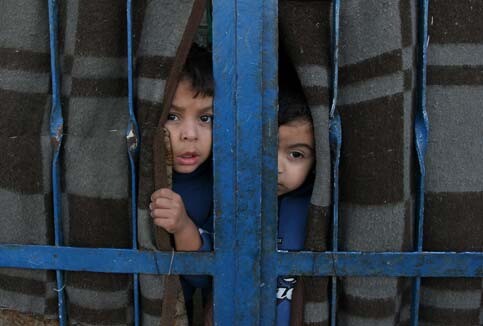United Nations Children's Fund 7 November 2006

Palestinian children snatch a glimpse of the funeral of Ahmad Naji, who was killed during clashes with Israeli forces in Beit Hanoun in Gaza, November 4, 2006. (MaanImages/Wesam Saleh)
Renewed violence in Gaza is again raising serious concerns about the welfare of civilians, including children. Now in its sixth day, the armed conflict has claimed the lives of an estimated 50 Palestinians - half of them civilians, and 8 of them children.
“The situation in northern Gaza, and in particular in Beit Hanoun, is very serious and is getting worse,” says UNICEF Representative in the Occupied Palestinian Territory Dan Rohrmann. “We have seen an extraordinary number of children being killed just in the last five days. There are tanks everywhere, shelling, house demolitions and there is fighting in the streets. People are getting quite desperate.
“The children are terrified by everything going on, including seeing family members being taken away,” adds Mr. Rohrmann.
More than 350 people have been wounded in the new violence in Gaza. Since the beginning of this year, over 100 children have died in the Israeli-Palestinian conflict - more than twice the total killed in 2005.
Food, water, medicines run low
The town of Beit Hanoun, with a population of about 30,000, has been sealed off and remains under curfew. The western part of the city is without electricity and water service to some 10,000 people.
Food supplies are running out because markets and shops cannot renew their stocks. At the same time, aid organizations have been prevented access to some of the most deprived areas.
“Health is a major issue, and at the moment people do not have access to primary health care facilities due to the curfew, the lack of health staff and the lack of drugs. People fear leaving their homes to go to health clinics,” explains Mr. Rohrmann.
Call for ‘unhindered access’
To address this humanitarian crisis, UNICEF has been working closely with partners such as the United Nations Relief and Rehabilitation Agency, the World Food Programme and the International Committee of the Red Cross/Red Crescent.
The partner agencies are providing food and water, and have helped repair water systems. UNICEF has been distributing family water kits as well as baby hygiene kits, which are especially needed by those who do not have access to safe water and by families with young, vulnerable children.
“The most important thing right now is to stop the violence and to guarantee that the UN and NGOs have got unhindered access to Beit Hanoun in order to deliver the critical assistance that is needed,” asserts Mr. Rohrmann.
Related Links


